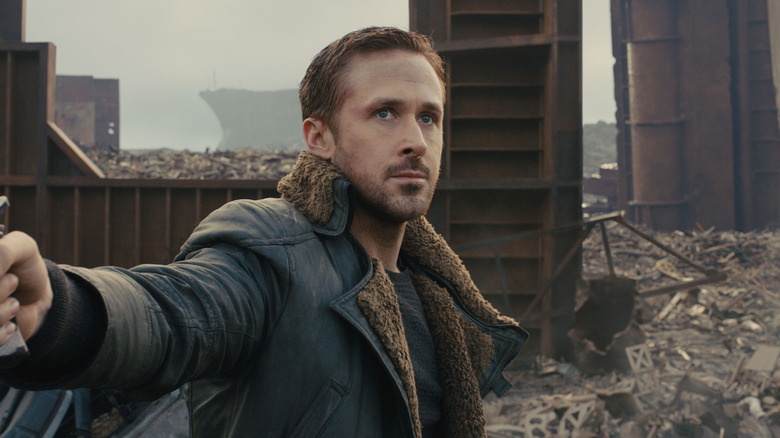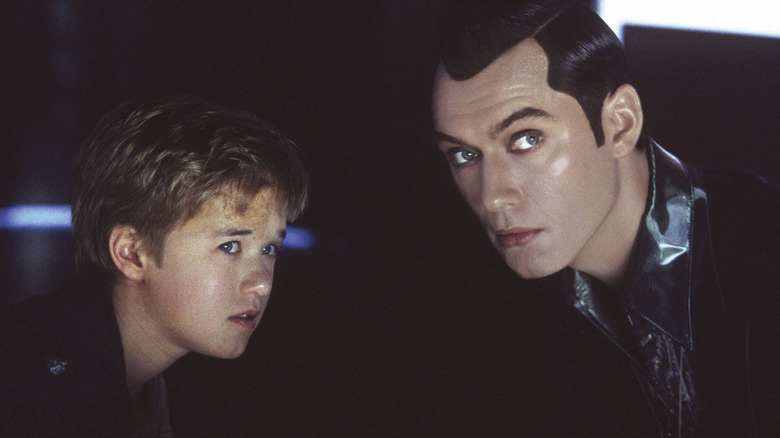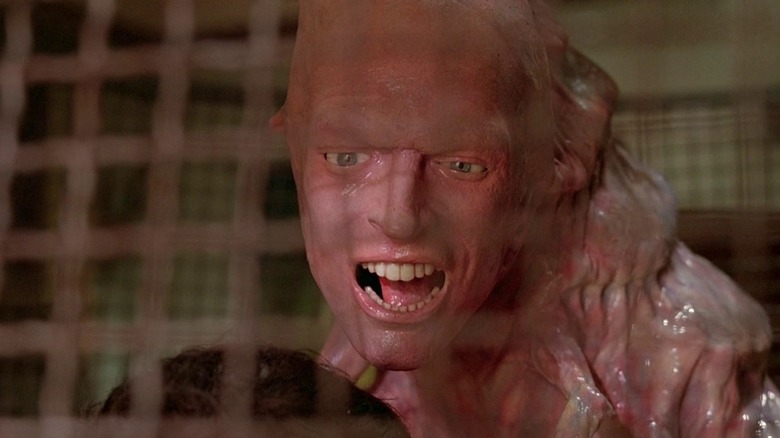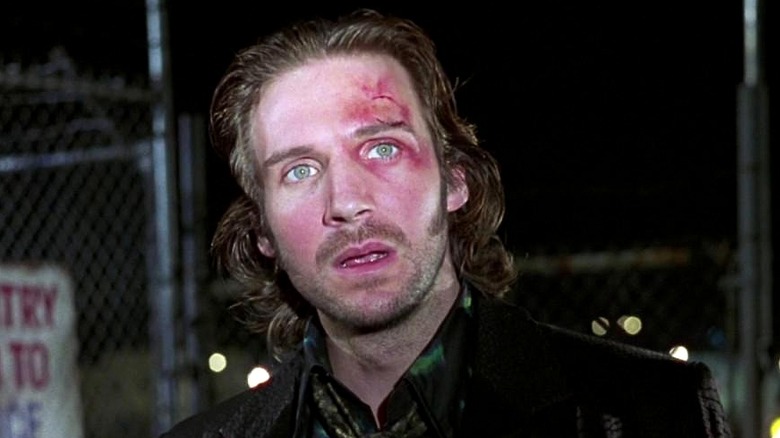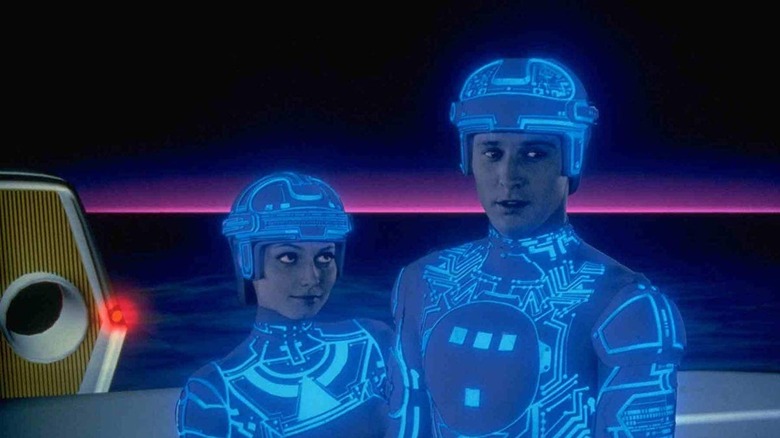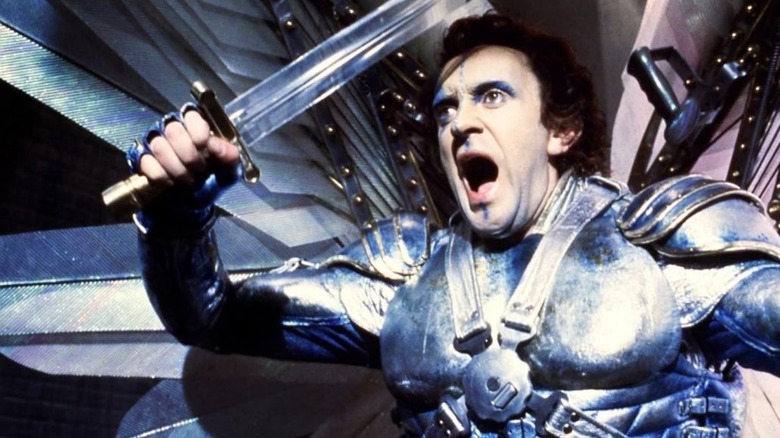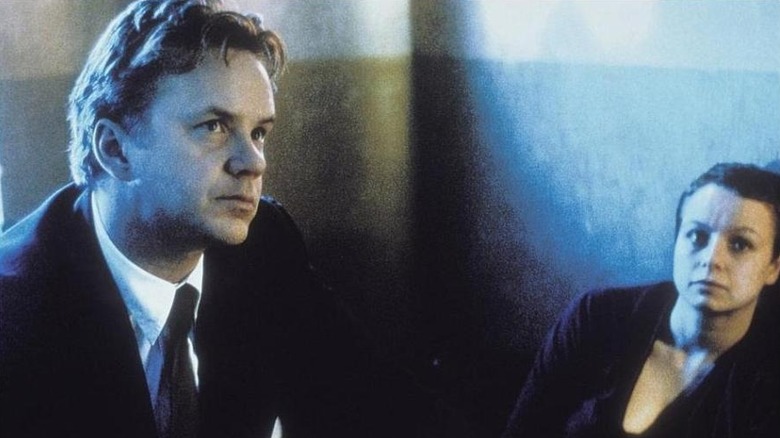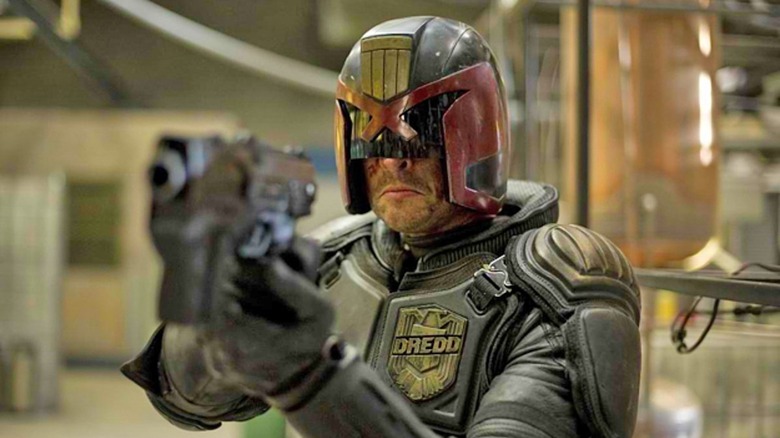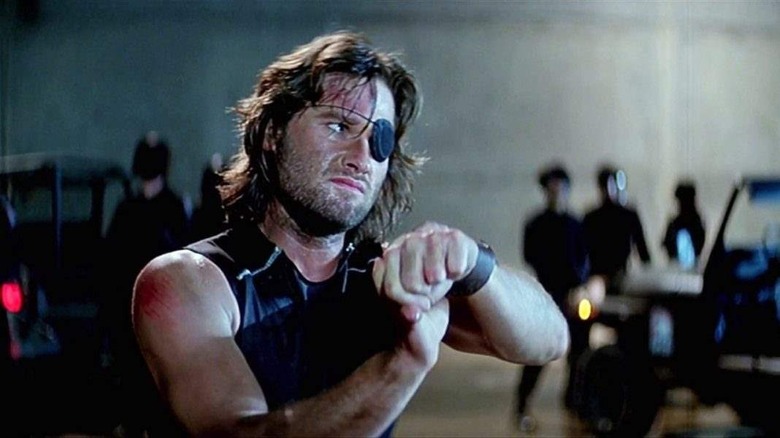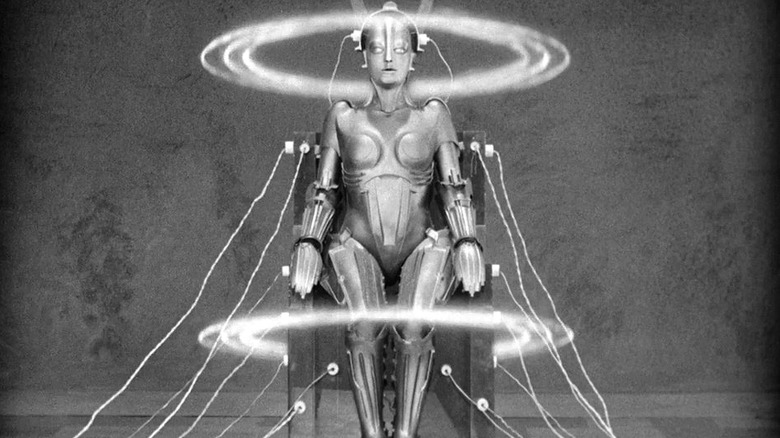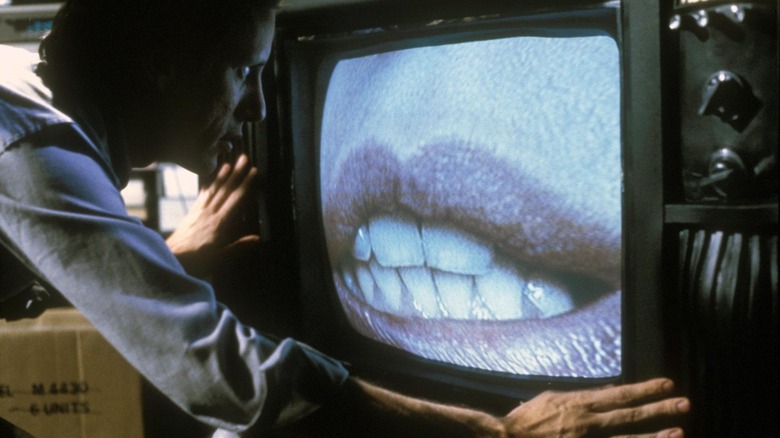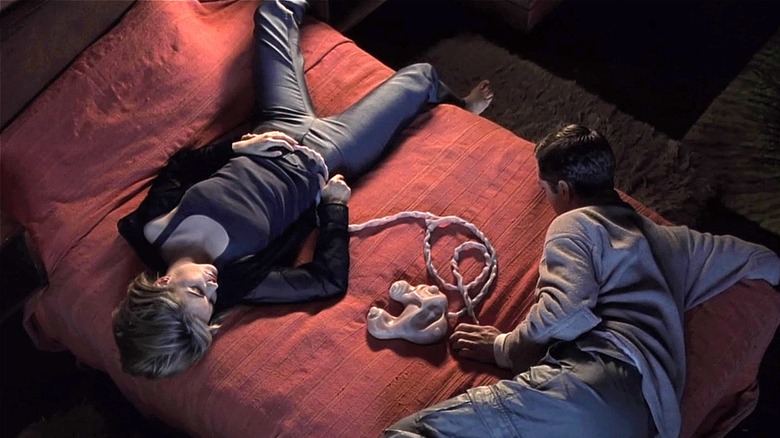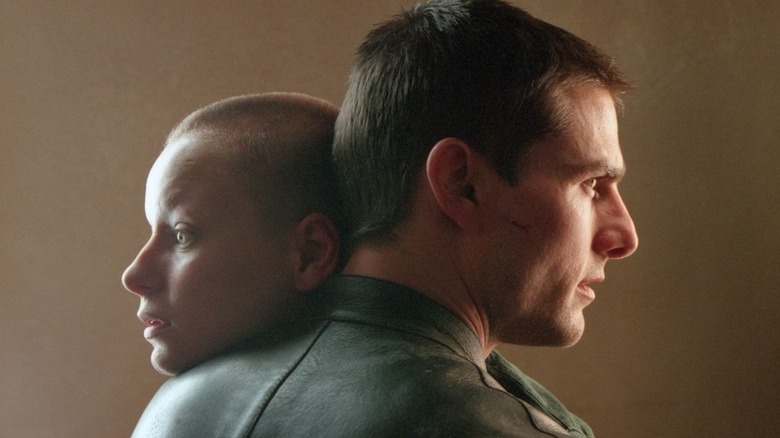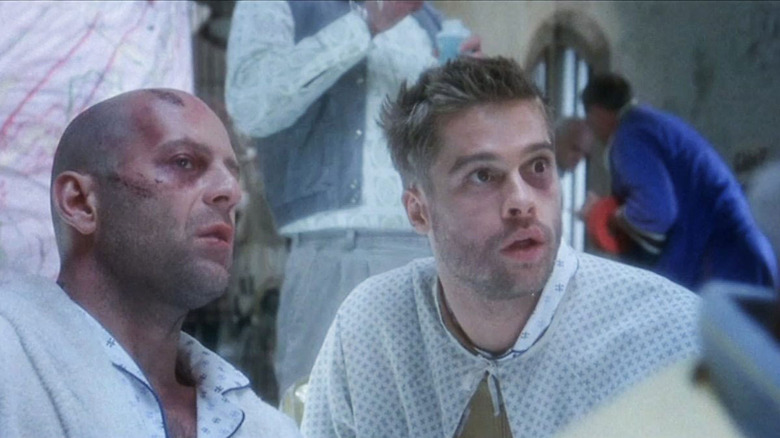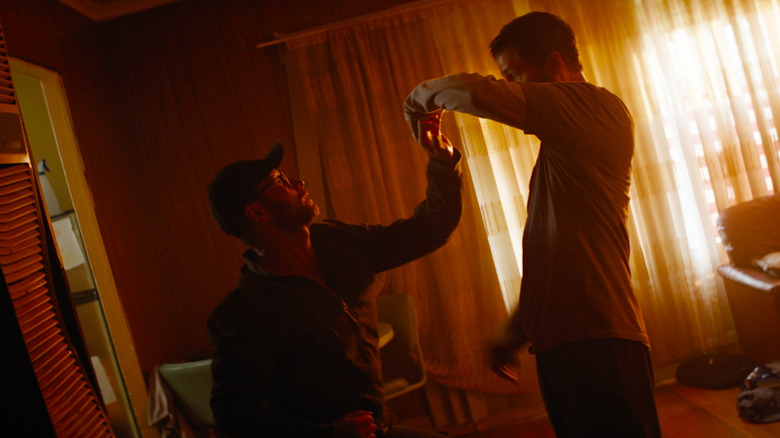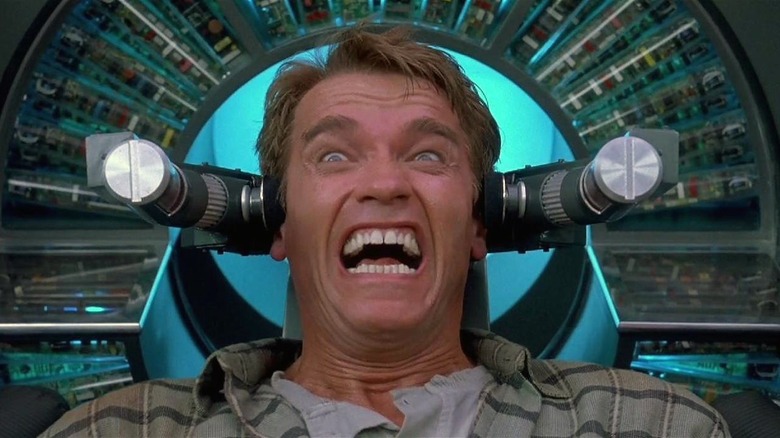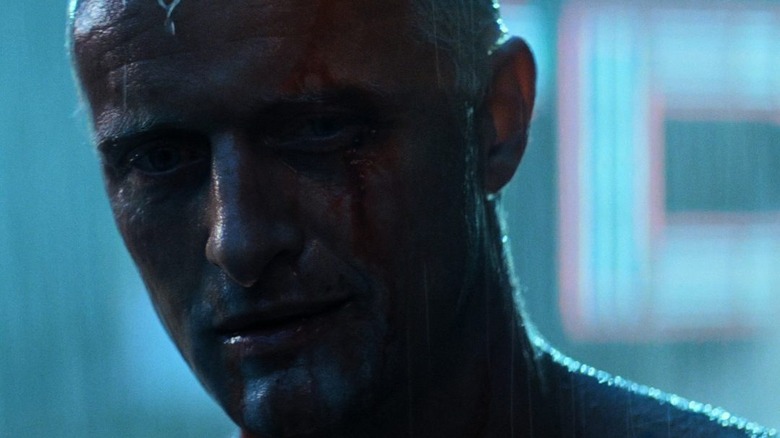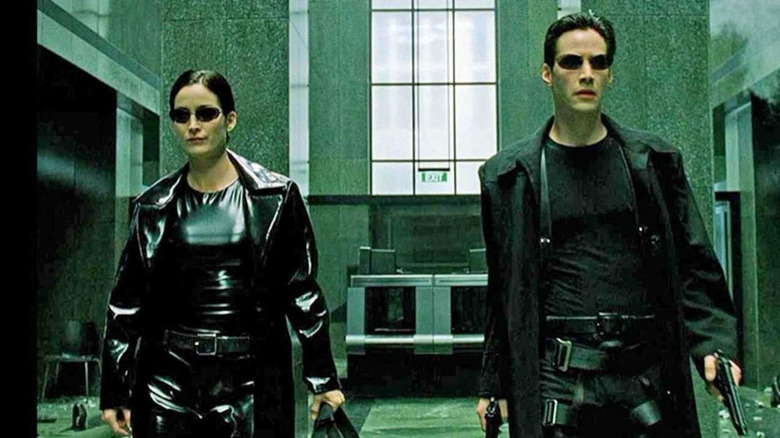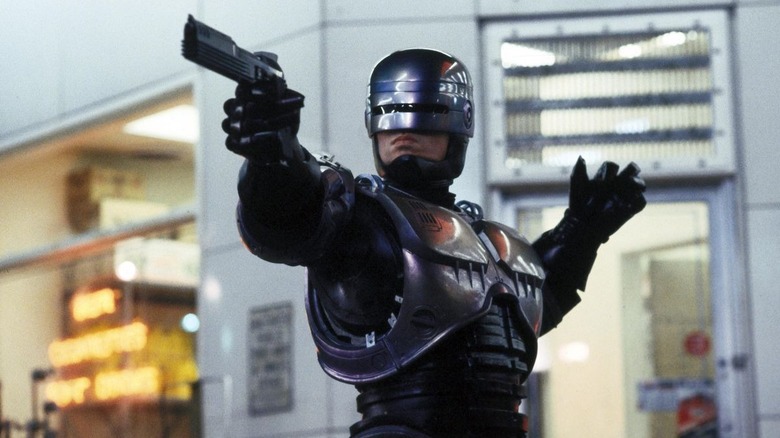The 22 Best Cyberpunk Movies Ranked
Science fiction films can inspire us with optimistic visions of the future. It's powerful to see a film that predicts humanity will better itself, as it gives us something to strive for. The optimistic cooperation of the "Star Trek" franchise showed how much better the universe would be if different cultures learned to peacefully coexist. Some sci-fi predictions even came true: In 1902, the Georges Méliès film "A Trip to the Moon" showed what a potential lunar voyage would look like over six decades before the "Apollo 11" mission. However, science fiction films aren't always this optimistic. There are many who believe that the future looks bleak. A science fiction film can be a dire warning about what is to come. If humanity continues to make the same mistakes, what hope can there be for society to just work itself out? Dystopian stories are frightening because their predictions sometimes feel all too real.
The cyberpunk subgenre is a specific niche within dystopian stories. It combines advanced technology, innovations in artificial intelligence, and vast metropolitan environments. While these stunning advancements would seemingly be the pinnacle of mankind's achievements, they only reveal how lonely we've become. Many of the characters trapped within cyberpunk worlds are pushed into the shadows. Heroism is rare, and it often comes from a motley group of protagonists. Cyberpunk cinema counts among it some of the greatest sci-fi classics of all time. Here are the 22 greatest cyberpunk movies, ranked.
22. Tokyo Gore Police (2008)
This film is about gore and police in the sprawling city of Tokyo. A deranged scientist by the name of "Key Man" (Itsuji Itao) has spread a virus that causes victims to grow strange, Cronenberg-style body weapons that they use with ferocious aggression. To meet this threat of so-called "Engineers," the Tokyo police deploy a neo-samurai force with a license to kill and brutalize.
The first clash begins on a city rooftop, and within a few minutes we've seen a blade mutilate an arm and a flying chainsaw do terrible damage to a police officer's throat and another's mouth. The cops may look tough but they're hapless compared to Ruka (Eihi Shiina), a specialist among specialists who uses a rocket launcher as a kind of trampoline to boost herself onto the rooftop, where she tears the "Engineer" limb from limb.
"Tokyo Gore Police" spends the rest of its 110 minutes in this fashion. The bloody zaniness is all Japanese, but it takes cues from elsewhere, too — namely Paul Verhoeven's satirical commercials in "RoboCop" and "Starship Troopers." It's comic book cyberpunk.
21. Elysium (2013)
Economic disparity is a major theme in cyberpunk stories. As is the case in real life, those with the ability to help others are not always generous in sharing resources. Neill Blomkamp's 2013 science fiction action thriller "Elysium" looked at the lengths that disadvantaged characters must go to in order to keep themselves safe.
In the 22nd Century, Earth has become an overpopulated wasteland. The wealthy elite reside in a space station called "Elysium" which contains advanced medical technology and scientific advancements. The poor are left to rot and suffer on their polluted home planet. On Earth, the construction worker Max Da Costa (Matt Damon) is poisoned by a lethal chemical. The cure is only available on Elysium. Max and his best friend Julio (Diego Luna) decide to break into the highly secure station. Elysium's Defense Secretary Jessica Delacourt (Jodie Foster) discovers their plot and dispatches the bounty hunter Agent M. Kruger (Sharlto Coppley) to pursue them.
20. A.I. Artificial Intelligence (2001)
Although the premise suggests that it is a heartwarming family adventure, Steven Spielberg's 2001 cyberpunk film "A.I. Artificial Intelligence" is a devastating tragedy. It's a story inspired by two genius filmmakers. The concept was initially imagined by the late great Stanley Kubrick, who sadly passed away before he could complete his work on the film. Prior to his death, Kubrick handed the reins to Spielberg, whom he imagined was the only director who could handle the advanced computer-generated imagery the story required.
"A.I. Artificial Intelligence" is set within the 22nd Century, where the worldwide population has been severely depleted. Androids that look human but lack emotion have been created. The couple Henry (Sam Robards) and Monica Swinton (Frances O'Connor) are grieving after their son falls in a coma. They adopt a young robot child named David (Haley Joel Osment). David seeks the love of a family but struggles to find acceptance.
19. Naked Lunch (1991)
"Without 'Naked Lunch' there would probably be no cyberpunk," wrote Richard Cadrey and Larry McCaffery in their book "Storming The Reality Studio: A Casebook of Cyberpunk." They were referring to William S. Burroughs' seminal beatnik novel from 1959, which David Cronenberg adapted for the screen decades later in 1991.
The nightmarish material was never going to make for a linear adaptation, so Cronenberg drew not just on "Naked Lunch" but also elements of Burroughs' other work and his turbulent personal life. The result is a beautifully made film that uses lighting, set design, and period tailoring to evoke the author's aberrant perspective.
Peter Weller leads as William Lee, a fictionalized version of Burroughs (who used "William Lee" as an early pseudonym). Lee is an exterminator and he enjoys the work, although his boss reprimands him for running short on insecticide. When we discover that his wife Joan is using the bug powder as an intravenous opioid replacement, the film loses whatever touch it had with reality and becomes a hallucinogenic ride of insect typewriters and inexplicable North African locales.
The cyberpunk qualities come not from a dystopian society but from a dystopian mind — Lee's drug-addled point of view is almost entirely psychotic. Like other cyberpunks, technology governs Lee's life, and in this case it is a series of mutant typewriters that assume bug-like forms, playing with his mind and his sense of reality. Weller carries the role effortlessly with a pensive charisma that balances the film's illusory excesses.
18. Strange Days (1995)
"Strange Days" was directed by Kathryn Bigelow and based on a script she developed with James Cameron that has all the trappings of the cyberpunk genre — crime, technology, and the city. The crime is gangland anarchy, the technology is a recording device named SQUID, and the city is Los Angeles in the final days of 1999. Navigating this is Lenny Nero (Ralph Fiennes), former LAPD officer and current black market creep.
He deals in SQUID, an illegal headset that records people's memories, stores them on memory discs, and allows others to replay them in intense virtual reality experiences. "This is like a piece of someone's life straight from the cerebral cortex," Nero explains to one of his customers. The possibilities here are endless and endlessly disturbing, because Nero's customers don't want the innocent stuff — they want perversion and violence. This technomoralism is part of the film's wider commentary on racism, corruption and social stratification.
In the 1990s, "Strange Days" was a total box office bomb, recouping just under $8 million of its $42 million budget. Today, with its striking imagery, explosive set pieces, and dark cyberpunk trappings, it's a cult film worth revisiting.
17. Tron (1982)
The cyberpunk genre isn't only popular with cinephiles, but with gamers too. Cyberpunk-style concepts have been used since the earliest video games were being developed. The 1982 film "Tron" imagined what would happen if someone was transported into the reality of a cyberpunk game. The film follows the former video game designer Kevin Flynn (Jeff Bridges), who now operates his own private arcade. Flynn is a tech wizard, but his attempt to hack into a system's mainframe goes wrong when he encounters a mysterious Master Control Program.
The MCP has become a sentient virtual intelligence program and built an entirely digital world. Flynn is transported into the game he once helped design, where he must use his arcade skills to beat the system and escape back to his own reality. While the visual effects in "Tron" may seem dated now, the themes are still relevant. The 2010 sequel "Tron: Legacy" successfully modernized the original concept with a heartfelt storyline featuring Flynn and his son Sam (Garrett Hedlund).
16. THX 1138 (1971)
Have you ever wondered what it would be like to live on a motherboard, nestled between rows of RAM and processors? George Lucas imagined something approximating this in "THX 1138," his directorial debut. The film is set in a 25th century society that's governed by a sterile cyborg entity like HAL 9000, only worse.
The titular THX 1138 is not a thing but a person, played by Robert Duvall. He lives in a vast underground complex of stark corridors and enormous assembly lines where nothing is organic, not even his human peers. Everyone and everything is fixed, programmed, and regimented. There is no family or friendship, only work. It's an ant colony of white coats and shaved heads. Who's controlling this? Who would want to live in such a society? Slave handlers above ground, perhaps — we don't know.
Those who come to "THX 1138" from "Star Wars" may be disappointed, because the films couldn't be further apart within the science fiction genre. But as a vision of dystopian institutional hell, "THX 1138" is an interesting experiment.
15. Brazil (1985)
After his involvement with the British comedy troupe Monty Python, Terry Gilliam brought the same satirical style to his films as a writer/director. Gilliam's work is both whimsical and bleak, and his 1985 cyberpunk story "Brazil" is his most imaginative achievement. The film is set within a totalitarian future overrun by industrialism and corporate synergy. A select group of elites reign supreme and the majority of citizens work in a dehumanizing bureaucratic metropolis.
The low-level government employee Sam Lowry (Jonathan Pryce) dreams of rising from oppression and becoming a great hero. Sam has mysterious visions of saving a beautiful woman. He meets a truck driver Jill Layton (Kim Greist) that looks like the damsel he's dreamed of, but she's accused of terrorism by the aggressive Central Services police force. Sam becomes unexpectedly involved with a resistance movement whose idiosyncratic rebel leader Archibald Tuttle (Robert De Niro) appears in his apartment after he's pursued by Central Service guards.
14. Code 46 (2003)
Romantic relationships are often doomed in cyberpunk films. Is true love even possible when the future looks so bleak? Michael Winterbottom's highly underrated 2006 film "Code 46" imagined a cyberpunk society where relationships are predetermined by government-approved DNA pairings. Utilizing genetic manipulation, the totalitarian state designs "ideal" relationships. This means that it's now impossible, and illegal, to fall in love naturally. These rules are established in a series of codes, with the title "Code 46" outlawing genetically similar people from having "incestuous" relationships.
William Geld (Tim Robbins) is an insurance fraud investigator who secretly helps companies identify which of their employees are using false identities. Due to strict travel laws, some "genetically inferior" workers use fake IDs to travel between cities. William interviews the receptionist Maria Gonzalez (Samantha Morton), and they bond after discovering they share a recurring dream. William falls in love with Maria, but their relationship is considered to be illegal.
13. Dredd (2012)
The Judge Dredd comic book character was developed in the comic strip "2000 AD" as one of the first cyberpunk heroes. The futuristic judge, jury, and executioner was a complex anti-hero. Unfortunately, the 1995 film "Judge Dredd" starring Sylvester Stallone failed to capture the tone of the original source material. The Stallone film was campy and didn't reflect the more nuanced moral dilemmas that the Dredd character dealt with.
Thankfully, the 2012 film "Dredd" was a proper adaptation. Karl Urban starred as the titular character, who is one of the many judges working the streets of a dystopian world known as "Cursed Earth." The Chief Judge tasks Dredd with training the new recruit Cassandra Anderson (Olivia Thirlby). Cassandra is a psychic who can invade the minds of suspected criminals. Dredd and Cassandra are assigned to take down the drug warlord Ma-Ma (Lena Headey), who has gathered her criminals in a futuristic sky-rise. They must fight their way to the top.
12. Escape From New York (1981)
John Carpenter's 1981 film "Escape From New York" is set in the future of 1997 when the United States has been overrun by criminal activity. As a desperate means of managing the growing prison population, the United States has turned New York City into a sprawling maximum-security prison where criminals are dumped. After Air Force One is hijacked when it passes over Manhattan, the President of the United States John Harker (Donald Pleasence) is kidnapped and held for ransom. The military must find a way to extract him, and they turn to an unlikely hero.
The notorious former Special Forces soldier Snake Plissken (Kurt Russell) is given a unique opportunity. Plissken has been imprisoned for robbery, but if he rescues the President he will receive a full pardon. Plissken is no fan of the government or the President, but it's the only option he has to avoid jail time so he ventures into the dangerous wasteland. Russell is a great lead for this mix of action, science fiction, and social satire. He has a defiant attitude that is reminiscent of classic western gunslingers.
11. Demolition Man (1993)
There are two main linchpins in the dystopian canon. One is the tyrannical world of "1984," in which brute force is the tool of compliance. The other is "Brave New World," where the masses are coerced not with violence but numbing pleasure.
"Demolition Man" is in the latter camp. It depicts "San Angeles” — a vast sprawl from San Diego to Santa Barbara — in the year 2032, a time when puritanical safetyism has washed over the people like the "soma" drug in "Brave New World." There is no murder, but there is also no coffee, no swearing, no alcohol, no contact sports, and nothing else that is remotely "dangerous." You even need a license for sex. There is, consequently, no real life left in the San Angeles metroplex — until Simon Phoenix (Wesley Snipes) wakes from his cryogenic stupor.
Phoenix was frozen in 1996, back when police knew how to restrain dangerous psychopaths. In 2032, however, Phoenix strikes the authorities like bowling pins, toying with them as they consult handheld tutorial videos in their attempts to arrest him. Forced to use their initiative, the authorities conclude they must meet like with like, so they thaw Sergeant John Spartan (Sylvester Stallone), a brawny straight-talker who is at odds with this anodyne world.
10. Metropolis (1927)
"Metropolis" is one of the most influential films in science fiction history. Everything from "Blade Runner" and "Brazil" to "The Fifth Element" and "Star Wars" are downstream from Fritz Lang's 1927 expressionist epic.
Even most casual viewers will recognize the iconic Art Deco megacity, which is a metaphor for class and capitalism. Joh Fredersen (Alfred Abel), the city's master, looks out at the awesome skyline from his penthouse office while anonymous workers toil in the bowels of factories. Wealth is in abundance, but only for the ruling class, and Joh is so preoccupied with maintaining and growing this wealth that he has lost all touch with those thousands of feet below him, if he ever did at all.
Important though "Metropolis" may be, I am sympathetic to complaints about its length from both critics of the 1920s and contemporary viewers. But even if you find this film to be something of an artifact, it is a feat of word building that will continue to resonate through the genre and wider culture.
9. Videodrome (1983)
The future is frightening, and terror of the unknown is a major theme in cyberpunk cinema. David Cronenberg epitomized these anxieties in his horrifying 1983 cyberpunk film "Videodrome." The film features grizzly body horror and offers social commentary on the media's desensitization to violence. James Woods stars as Max Renn, the pretentious president of the Toronto television station CIVIC-TV. The station's operator Harlan (Peter Dvorsky) shows Max a mysterious broadcast signal that is invading their network broadcast.
The signal which is known as "Videodrome" hails from Malaysia, and features disturbing recordings of torture and murder. Max is fascinated by this depraved form of snuff entertainment and decides to broadcast it on CIVIC-TV. As Max grows increasingly obsessed with "Videodrome," he learns that the recordings are actually live streams. It turns out that "Videodrome" is a form of propaganda from a radical anti-authoritarian group, and they add new members through addictive graphic content.
8. eXistenZ (1999)
"Jumanji: Welcome to the Jungle" has some funny gaming gags about non-player characters (NPCs), but David Cronenberg's "eXistenZ" did it about 20 years earlier. The curious title refers to Allegra Geller's (Jennifer Jason Leigh) new virtual reality game that uses "UmbiCord" biotechnology to plug people into the simulation via a "bio port" implant in their spine.
Imagine plugging yourself into a games console and feeling an untold number of experiences as if you were really there. Boredom would be a thing of the past, but so would the distinction between reality and illusion. Why live in the real world when you can plug into wild fantasies and live unbothered by the difficulties of life? Many embrace it, but some — including the violent "Realists" group — actively fight it.
As Geller takes to a conference stage to introduce eXistenZ, she is confronted by a "Realist" who opens fire, wounding her and several others. Geller escapes and takes to the road with Ted Pikul (Jude Law), a nervous publicist. As they travel, we learn more about the game and its ramifications, as well as the level of threat against Geller's life.
"eXistenZ" didn't make a big impression on release in 1999 and it remains a neglected entry in Cronenberg's filmography, despite the fascinating questions it raises about life, entertainment, and virtual reality.
7. Minority Report (2002)
Steven Spielberg's filmography grew darker during the 21st Century. His 2002 cyberpunk film "Minority Report" is a grim, oddly prophetic neo-noir that asks a challenging question: How much of the future is set in stone? In 2054 a special division of the police department called "Precrime" utilizes psychic precogs to stop criminals before they commit a murder. While this would seemingly end crime forever, some skeptics have questioned whether a person's innocence or guilt can be determined based on events that haven't occurred yet.
The Precogs predict that Precrime commanding officer John Anderton (Tom Cruise) will murder a man named Leo Crow (Mike Binder) in 36 hours. Anderton is shocked, as he's never heard of Crow and doesn't believe that he could ever kill someone in cold blood. The Department of Justice auditing officer Danny Witwer (Colin Farrell) leads a squad to capture Anderton, who avoids these hunters while searching for the truth about Crow.
6. Twelve Monkeys (1995)
Sometimes, cyberpunk movies face the challenge of introducing complex mythology to the audience. Transporting a character from the familiar to the unknown is a great way to show the viewers exactly what has changed. Time travel can be a great plot device with which to do this, since the protagonist is experiencing changes at the same time that the audience is. Terry Gilliam's bizarre 1995 film "Twelve Monkeys" is one of the best cyberpunk time travel movies. Gilliam adapted the classic French sci-fi short film "La Jetée" into a full-length narrative. The story begins in 2035 when humanity is dealing with a deadly virus that has ties to a radical group known as "The Army of the Twelve Monkeys."
Convicted criminal James Cole (Bruce Willis), who is held captive in an underground lair, is transported back in time to identify the origin of the virus. Unfortunately for Cole, he's sent back too early, and ends up in 1990, years before the virus hits. As such, medical officials assume that he's insane and commit him to an asylum. Cole thinks his mission has failed, but finds a new lead when he meets the leader of the Twelve Monkeys: Jeffrey Goines (Brad Pitt). Jeffrey's anti-corporatist views stem from the resentment he feels towards his father, Dr. Leland Goines (Christopher Plummer).
5. Upgrade (2018)
In the unpredictable future of a cyberpunk film, true friendships are rare. The 2018 revenge thriller "Upgrade" centers on an unusual relationship that comes after a tragedy. The mechanic Grey Trace (Logan Marshall-Green) has a deep distrust of technology. Although most of the world is overrun by robotic advancements, Grey prefers to build things with his own two hands.
Grey is proud of a custom vehicle he's designed, but it crashes while he's driving with his wife Asha (Melanie Vallejo). The couple is stranded in the dangerous streets where a violent criminal gang murders Asha and breaks Grey's back. Now a wheelchair-bound quadriplegic, Grey is forced to merge his paralyzed body with the artificial intelligence program STEM (Simon Maiden). Grey hates that he now must rely on a robot, but he discovers that STEM can transform his body into a lethal weapon. He goes on a mission to track down the criminal gang and avenge his wife's murder.
4. Total Recall (1990)
At their best, cyberpunk movies can leave viewers with questions that linger far longer than the credits. Complex stories can be viewed in different ways, as each audience member applies their own personal beliefs to their interpretation of the film's ending. There are few cyberpunk movie endings that provoke as much heated discussion as "Total Recall." Arnold Schwarzenegger stars as Douglas Quaid, a lowly construction worker who dreams of visiting a colony on Mars. He's intrigued by the prospect of life on another planet and decides to experience it the only way he knows possible: Douglas goes to the virtual reality simulation program "Rekall" to have a Martian adventure implanted in his mind.
However, the appointment goes horribly wrong and Douglas is pursued by secret agents. His wife Lori (Sharon Stone) informs him that it's not the Martian adventure that's an illusion; he's actually a highly trained secret agent, and his average life on Earth is the illusion that Rekall created. What is real? What is Rekall? Douglas is forced to ask these questions throughout his adventure, and audiences are left to dissect the same mysteries for themselves.
3. Blade Runner (1982)
It makes sense that the cyberpunk genre frequently intersects with noir stories. The classic noir films of the '40s and '50s centered on lonely private eyes who solve mysteries within cold, grim cities. As these investigators or anti-heroes uncover clues, they discover secrets that reveal the worst that humanity has to offer. Even in a vast and sprawling metropolis, they somehow still feel alone. Ridley Scott's visionary science-fiction classic "Blade Runner" took the noir genre into the not-so-distant future. Based on the short story "Do Androids Dream Of Electric Sheep?" by famed sci-fi author Phillip K. Dick, "Blade Runner" questions the role of technology and the possibility that mankind could create sentient artificial intelligence. It's hardly the first sci-fi movie to introduce android characters, but the replicants of "Blade Runner" come to question their own mortality.
The titular "Blade Runner" is Rick Deckard (Harrison Ford). Blade runners are elite private investigators who hunt down androids called "replicants" who have lasted longer than their intended lifespan. Set in November 2019, "Blade Runner" follows Deckard as he searches for a rogue group of replicants led by the messianic Roy Batty (Rutger Hauer). He travels with another replicant, Rachael (Sean Young), with whom he gradually falls in love. The irony is that while he believes himself to be human, Deckard only learns about empathy through interacting with replicants.
2. The Matrix (1999)
Although cyberpunk stories are set within the future, their influences can be much older. With their cyberpunk classic "The Matrix," the Wachowski sisters drew inspiration from the ancient Greek philosophies of Plato. Plato's "Allegory of the Cave" presented the idea that mankind was not questioning the nature of their reality, that people simply accepted the information that was fed to them without prying any further. As a result, humans were in a metaphorical cave of sorts. They were simply watching shadows on the walls instead of living in the real world. The Wachowskis took this premise and translated it into a stark vision of a future overrun by technology. A highly advanced artificial intelligence network called the Matrix has secretly taken hold of the consciousness of a majority of the worldwide population.
Hooking humans up to a vast computer network, the Matrix keeps them occupied by simulating their reality. Most of these humans haven't noticed it, but they're being used to feed an ever-growing technological villain. A few brave survivors have managed to wake themselves up. The resistance leader Morpheus (Laurence Fishburne) mans a crew of rebels on the ship Nebuchadnezzar as they avoid the forces of the machine world. Morpheus believes in a coming messiah called "The One" that will save the future. He comes to believe that this "One" is the computer programmer Thomas Anderson (Keanu Reeves), who also goes by his hacker codename Neo. Morpheus introduces Neo to the truth.
1. Robocop (1987)
Cyberpunk movies have the opportunity to combine multiple subgenres into unique experiences. Just because a film is set within a dystopian future doesn't mean it can't be funny, exciting, and provocative all at once. Many of the best cyberpunk films also function as great entertainment but have deeper questions on their mind. Few filmmakers can combine pop entertainment with nuanced social commentary better than the genius Paul Verhoeven. Verhoeven incorporates social satire that takes multiple viewings to fully appreciate. There's no film that shows this better than Verhoeven's 1987 masterpiece "Robocop."
It's not only one of the bloodiest action movies of the 1980s but a clever commentary on corporate culture and neoliberal politics, a distinct product of the Reagan era. Set in a dystopian future where cities are overrun by crime, "Robocop" follows Detroit police officer Alex Murphy (Peter Weller) trying to clean up the streets, but the cops are simply overwhelmed by deadly criminal gangs that dominate the city. After tracking down the crime lord Clarence Boddicker (Kurtwood Smith), Murphy is shot down and brutally tortured. He dies from his wounds, but an ambitious young executive at the mega-corporation Omni Consumer Products has an idea on how to bring him back to life.
